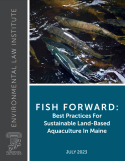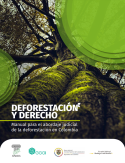
Research Reports
ELI publishes Research Reports available for free download that present the analysis and conclusions of the policy studies ELI undertakes to improve environmental law and policy. These reports contribute to education of the profession and disseminate diverse points of view and opinions to stimulate a robust and creative exchange of ideas. Those publications, which express opinions of the authors and not necessarily those of the Institute, its Board of Directors, or funding organizations, exemplify ELI’s commitment to dialogue with all sectors.
As promised during our meetings and stakeholder workshops on the week of June 12th, the Belize Fishery Project team is pleased to share our Summary Report on Stakeholder Workshops and Meetings, which had a primary aim of sharing draft project findings with fishers to exchange information and understand fishers’ experiences. We had the opportunity to present our draft findings to representatives of the government. We are working with the government to plan and conduct technical discussions on the methodologies, data, and findings thus far of the project.
Read More >
The nascent state of the land-based aquaculture (LBA) sector makes this an opportune moment to assess the regulatory framework governing LBA in the United States. Fish Forward seeks to accomplish this through rigorous analysis that identifies regulatory gaps in—and opportunities for—addressing and mitigating the industry’s environmental impacts, particularly in finfish production.
Read More >
El presente Manual Judicial proporciona recursos que los jueces pueden aplicar para decidir casos relacionados con la deforestación en Colombia, y esta introducción proporciona un contexto para el desarrollo del manual, reconoce a los socios y a los individuos responsables del desarrollo del mismo, y proporciona una breve descripción sobre cómo utilizarlo.
Read More >
Model Executive Order on Municipal Leadership on Food Waste Reduction: With and Without Commentaries
Given the large amount of food that some municipalities procure and the many people that they employ, the impact of food waste reduction measures in municipal operations can be substantial and far-reaching. For example, New York City purchases $500 million worth of food each year and employs around 325,000 people across dozens of agencies.
Read More >
Changes in the interpretation of Waters of the United States (WOTUS) resulting from judicial decisions or federal rulemaking place a substantial burden upon state and tribal regulators and legislators. States, in particular, must determine whether, and how, to keep up with shifting federal coverage by adopting and implementing protections for waters that are not protected by federal law.
Read More >